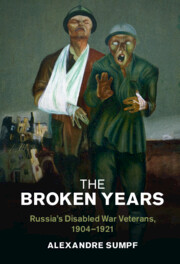Book contents
- The Broken Years
- Studies in the Social and Cultural History of Modern Warfare
- The Broken Years
- Copyright page
- Contents
- Figures
- Tables
- Acknowledgements
- Note on Usage
- Introduction
- 1 An Overwhelming Loss
- 2 The Right to Health
- 3 A Social Status Renegotiated by the War
- 4 Discriminatory Social Welfare
- 5 An Ephemeral Political Spring
- 6 The Devaluation of the War Experience
- Conclusion
- Bibliography
- Index
5 - An Ephemeral Political Spring
The Activism of Disabled Veterans in Russia (1917–1919)
Published online by Cambridge University Press: 10 February 2022
- The Broken Years
- Studies in the Social and Cultural History of Modern Warfare
- The Broken Years
- Copyright page
- Contents
- Figures
- Tables
- Acknowledgements
- Note on Usage
- Introduction
- 1 An Overwhelming Loss
- 2 The Right to Health
- 3 A Social Status Renegotiated by the War
- 4 Discriminatory Social Welfare
- 5 An Ephemeral Political Spring
- 6 The Devaluation of the War Experience
- Conclusion
- Bibliography
- Index
Summary
From 1904 on, the question of disabled veterans was in no way neutral on the political level. It fostered health care and social welfare policy, impelled an interpretation of the ongoing war, and reconfigured notions of heroism, sacrifice, and patriotism. The period 1915–1919 was marked by the disabled veterans’ remarkable political activism under three successive regimes, two revolutions, and two wars. As the only large-scale association of First World War veterans in Russia, the All-Russian Union of Maimed Soldiers managed to rally together men linked only by a common fate. They exerted a visible influence on the solution for the ‘disabled veterans’ question’ in 1917 and put out publicity for their own cause thanks to democratisation. They did not, however, manage to unify a group suffering a host of divisions stemming from the era’s political turbulence, nor did they succeed in consolidating a common identity distinct from that of all war veterans or all disabled persons. Their rapid, forced political demobilisation during the civil war made them veterans who had experienced both the Great War and the revolution and who were durably stigmatised by the Bolshevik regime. They suffered discrimination that benefited the disabled veterans of the Red Army, the only ones deemed legitimate under the Soviet regime. The political repression only doubled the punishment of their handicap.
- Type
- Chapter
- Information
- The Broken YearsRussia's Disabled War Veterans, 1904–1921, pp. 194 - 230Publisher: Cambridge University PressPrint publication year: 2022

